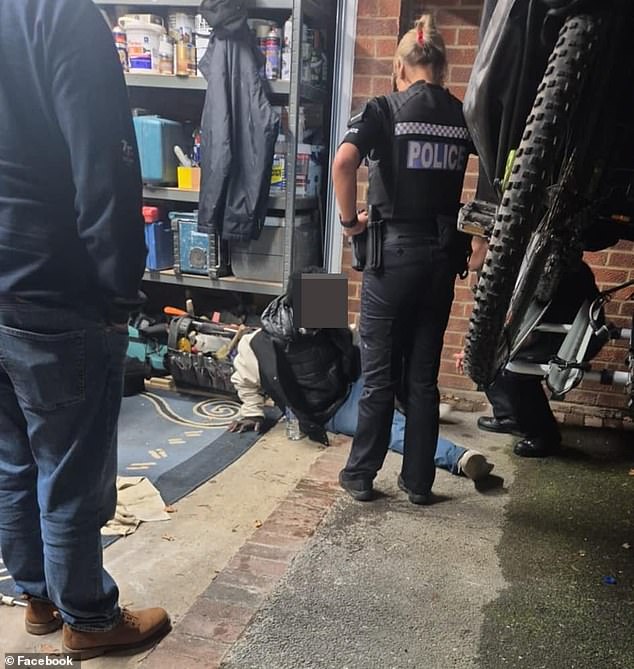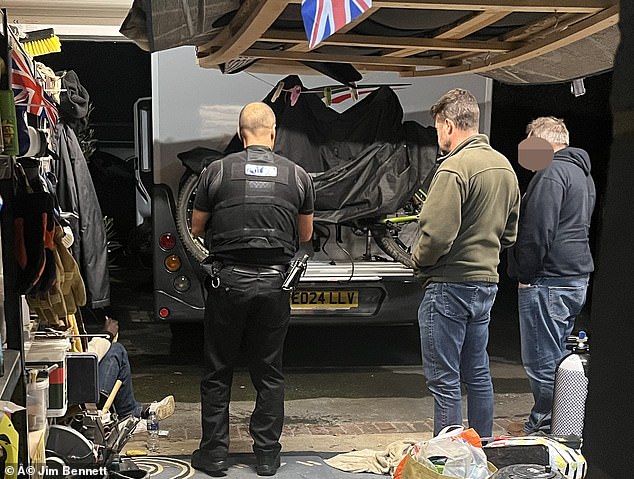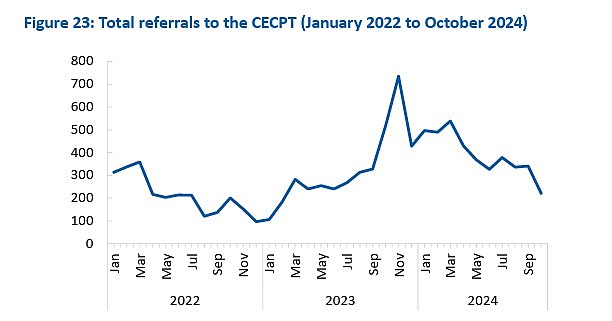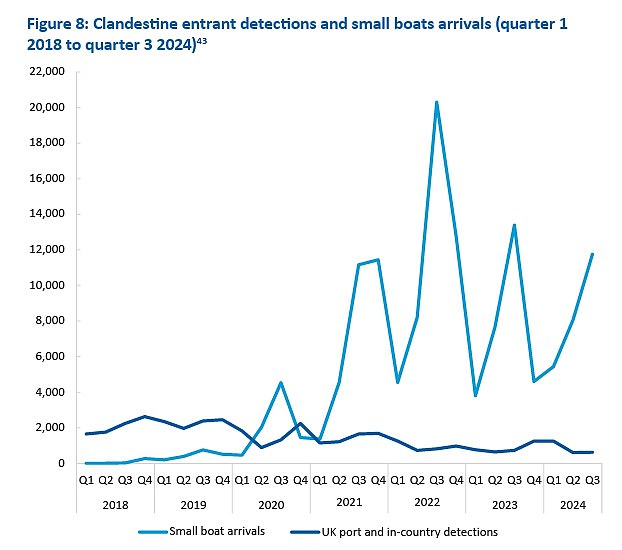Brits have been fined a staggering £25million in just over one year for ferrying illegal migrants across the channel in their vehicles, MailOnline can reveal.
Travellers have been fined thousands of pounds under a little known and increasingly controversial scheme designed to crackdown on the floods of migrants sneaking into Britain.
Under the scheme drivers can be fined up to £10,000 for each illegal migrant found hiding in their vehicle on their way to the UK, even if they had no knowledge of their existence.
Drivers can also be made to pay up to £6,000 if their vehicle is not ‘adequately secured’ – even if no clandestine entrant is found.
The penalties have been criticised for encouraging people against reporting illegal migrants they discover – because by telling the authorities they open themselves up to receiving a bumper fine.
Of those fined only one person was successful in getting their punishment rescinded, figures obtained from a Freedom of Information request show.
Since January 1 last year, 5,906 penalties totalling £25,662,299 have been imposed by the Home Office under the Clandestine Entrant Civil Penalty Scheme.
Hauliers have typically been the target of most fines but the scheme received increasing scrutiny after a public spirited couple were punished for reporting a stowaway in their van – sparking widespread astonishment and even the intervention of Prime Minister Sir Keir Starmer.

Joanne and Adrian Fenton (pictured) were originally ordered to pay £1,500 by the Home Office when they reported a migrant clinging to the back of their motorhome after returning from France

The public spirited couple immediately called the police after discovering the illegal migrant

Police officers arrived at the couple’s house in Heybridge, Essex. Just over two months later they were issued with a fine for failing to ‘check that no clandestine entrant was concealed’
Adrian and Joanne Fenton, from Heybridge Essex, were fined £1,500 by the Home Office after reporting a migrant in their motorhome after returning from France.
The couple were shocked to find a Sudanese man inside a bag covering a bike rack on their motorhome after a long drive back from Calais and immediately called the police, who took the man away for processing.
Yet just over two months later, the pair were issued with the fine for failing to ‘check that no clandestine entrant was concealed’ in the camper van.
Mr Fenton appealed to Border Force by making a ‘notice of objection’ detailing why he believed the penalty was unfair.
While their fine was waived after growing public pressure, their ‘liability’ remained.
A letter from Border Force said: ‘The written notice of objection has been carefully considered and the Secretary of State has decided that your liability stands.
‘However, after review of the case by a senior officer the level of penalty per clandestine entrant or person concealed being a clandestine entrant has been revised to UK £0.
They are not the only innocent couple to unknowingly end up on the wrong side of the law, with a retired ambulance service worker previously warning Brits to be on high alert during Channel crossings.

Great-grandfather Peter Hughes (pictured with his wife Anne) was initially fined a staggering £6,000 after a man was found hiding inside his small camping trailer at the Port of Calais

A young Sudanese man (pictured) was found by French border force officers hiding inside the small trailer attached to the couple’s converted motorhome

The number of referrals for fines under the Clandestine Entrant Civil Penalty Scheme
Great-grandfather Peter Hughes, 75, from Droylsden, Tameside, was initially fined a staggering £6,000 after a Sudanese man was found hiding inside his small camping trailer at the Port of Calais in France.
After an appeal accompanied by substantial political and media pressure, this sum was eventually reduced to £150 – which he begrudgingly paid despite he and his wife, Anne, knowing nothing about the migrant’s existence.
Of the almost 6000 penalties issued since the beginning of last year, only 2295 have so far been paid, although some are still being disputed or are not yet due for payment.
While 127 appeals have been lodged against the fines, just one has been successful.
The triumphant appeal saw the Home Office rescind a Kent couple’s £3,000 fine after they unwittingly drove two Sudanese migrants through Calais in their campervan.
Lisa Russell and Geoff Evans were stopped by border officers in France on their return from holiday and were slapped with the penalty despite having ‘no idea’ a man and teenager were hidden in the bike rack of their van.
But their appeal, the only successful one in a 15-month period, saw the Border Force ‘exercising general discretion’ and remove their penalty.
A letter from Border Force said: ‘Following a review of the case we have decided to revise the penalty, and conclude that you have demonstrated, to the extent required, that you complied with the regulations.

This graph compares the number of migrants found trying to sneak into the country on vehicles and those arriving by small boat
‘The Secretary of State has chosen to exercise general discretion and exceptionally, on this occasion, your penalty has been reduced to £0.’
Others have had their fines reduced with one haulage company paying £7,566 after an original £48,000 bill.
Around 5,000 ‘clandestine entrants’ were found last year at UK border controls in Calais, Coquelles and Dunkirk, according to a report by the immigration and borders watchdog. Inevitably, others would have managed to evade checks.
Meanwhile, more than 30,000 migrants have now arrived in Britain by small boat under Keir Starmer – as the number of arrivals continues to surpass that of any other year or Prime Minister on record.
A Home Office spokesperson said: ‘We are fully committed to stopping people from illegally entering the country and cracking down on people smugglers, which is why the Clandestine Entrant Civil Penalty Scheme is there to ensure drivers take every reasonable step to deter irregular migration.
‘We understand that recipients of penalties may disagree with the circumstances of the fine. The option to appeal and trigger a review is made clear in supporting documents.’







